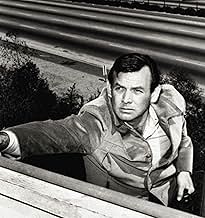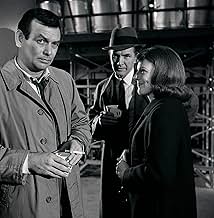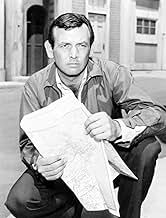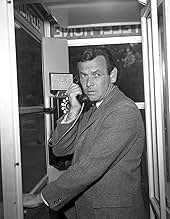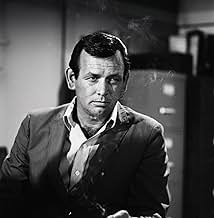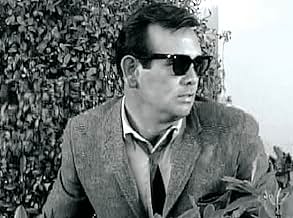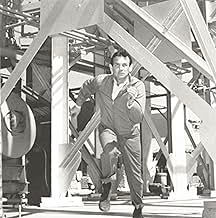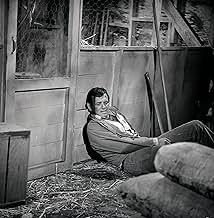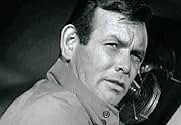Un medico, ingiustamente condannato per un omicidio che non ha commesso, sfugge alla custodia e deve stare davanti alla polizia per trovare il vero assassino.Un medico, ingiustamente condannato per un omicidio che non ha commesso, sfugge alla custodia e deve stare davanti alla polizia per trovare il vero assassino.Un medico, ingiustamente condannato per un omicidio che non ha commesso, sfugge alla custodia e deve stare davanti alla polizia per trovare il vero assassino.
- Vincitore di 1 Primetime Emmy
- 5 vittorie e 10 candidature totali
Recensioni in evidenza
Dr. Richard Kimble,an innocent victim of blind justice..... Falsely accused for the murder of his wife when a train wreck frees him on route to the death house....FREED HIM...To hide in lonely desperation and to go from town to town toling at many jobs...... FREED HIM...To search for the one-armed man leave the scene of the crime and to go after him for the murder of his wife.... FREED HIM...To run before the relentless pursuit of the Police Lt. who is obsessed with his capture...
Of course the character of Richard Kimble was loosely inspired by Dr. Sam Sheppard who was convicted and sentenced to 10 years in prison for the 1954 murder of his wife,Marilyn,but was acquitted in a second trial in November of 1966 for a murder he did not commit. The major difference was that Richard Kimble spent four years chasing the real killer who was near the scene of the crime(a one-man armed man)while he was being framed for a murder that he didn't commit,whose wife was brutally murdered in her own home while she was alone,and he was blamed for the crimes....That is basically setting up an innocent man who had nothing to do with the crimes,but also was trying taking his life to hell in a handbasket for something he didn't do! That's wrong! That's blind justice gone astrayed! But the series "The Fugitive" was grand entertainment at its finest hour,and let me explained how......
I.)The Black and White Episodes:Seasons One Through Three:1963-1966
From its premiere episode in September of 1963,"The Fugitive",was grand suspenseful and intriguing entertainment at its finest and with the black and white episodes that came out,it works on many levels,and we are introduced to the character of Richard Kimble(David Janssen),and his adventures going from town to town as he stays one step ahead of the Police Lt. in charge of the manhunt for Kimble,Phillip Gerard(Barry Morse),and the search of the one-armed man who killed his wife,Fred Johnson(Bill Raisch). During the first three seasons of the show,it presented a good decent,and well developed main character and from there evokes emotion from the viewer by having something happening to him that he absolutely doesn't deserved,which evoke genuine emotion,plus he was a character whom viewers can empathize with. Whatever pain he was feeling,the audience felt it too. And each week there was always something happening as Kimble stumbles into each town or city for someone's help or help comes to him,and right away the trouble ensues and the suspicious party that recognizes Kimble's wanted poster from the police bulletin,are right there to call the authorities with by the way,Kimble easily escapes them with just a slip from the cops in the local town and from there drifts into a new venture where he must stay one step ahead of Gerard and to one step toward the lookout for the one-armed man. Kimble eluders his pursuers,gets away for another week while we see him walking backwards down the road,thumbling a ride with a sack over his shoulder. A car passes him,he turns around keeps walking while the legendary William Conrad's voice speaks in the background,"Richard Kimble:Fugitive. Still searching for the one-armed man". "The Fugitive" was an incredible exercise in formulatic writing when nowadays is used as a textbook on
"The Effect Screen writing Of Classic TV Shows",which as of this writing several college campuses and universities are using this format as a part of the TV writing and Journalism courses as a teaching tool for those who are interested in this venture. So college courses show this series as a backdrop on how to write,and produced standard TV shows and it works!(The Black and White episodes of this series) Back to the TV show,"The Fugitive",the show followed the standard Quinn Martin production formula of prologue,multiple,and epilogue--which is basically used in several QM produced shows to follow like,"The FBI","The Invaders","Dan August","Cannon","The Streets Of San Francisco","Barnaby Jones","The Runaways","Harry-O" and so forth.
Here is the summary formula for almost every show: 1. Prologue 2. Act One 3. Act Two 4. Act Three 5. Act Four 6. Epilogue
II.)The Color Episodes:Season Four:1966-1967. In the fall of 1966,"The Fugitive" made the transition from shades of gray(black and white)to color,and from there the show suffered in the ratings,but before the producers(Quinn Martin and Roy Huggins)let ABC bring down the axe of this show,they decided by not risking the series to be cancelled without having a finale. However,the format was basically the same with Kimble staying ahead of Gerard,but the last two episodes of the series were simply put the greatest upset in the history of television. The two-part finale of The Fugitive entitled,"The Judgment",aired on August 27,1967 and the last episode of the series on August 28,1967,after an astounding four seasons and 120 episodes. After four grueling years of chasing and being chased,Kimble finally catches up with the one-armed man,who admits to having been Helen's real killer. In the climax,Kimble chases Johnson on top of the building and from there Johnson is shot and killed by Lt. Gerard,who saves Kimble in the process and is acquitted of all charges. It went on to become one of the highest rated TV finales of all time,and still is in the top ten of the best TV finales ever made.
It was a very realistic drama show and David Janssen drew the audience into his predicament. Whatever pain he was feeling, the audience felt too. He was a man who viewers could empathize with. Each week he travelled from place to place meeting up with people, most of whom sympathized with his predicament. There was tension and drama throughout the entire series run. It was a very believable drama. It's a pity that nobody can produce shows like that any more.
One other thing; I believe this show inspired The Incredible Hulk live action series from the late 70's. In both cases, innocent men were on the run for crimes they didn't commit, both men were pursued (David Banner was pursued by a reporter) and both David Janssen as Kimble and the late Bill Bixby as David Banner drew the viewers into their predicament.
Such summarizes the huge effort Roy Huggins invested to get The Fugitive to television. Teaming with producer Quinn Martin, Huggins' concept was made flesh with the casting of David Janssen as Dr. Richard Kimble and British-born Canadian Barry Morse as his nemesis, Lt. Philip Gerard. Huggins and Martin worked to make a compelling weekly drama via superb scripts, top-notch guest casts, and enticing music by Peter Rugolo, and succeeded perhaps more than they ever dared to hope.
The Fugitive remains compelling television 40 years later. Janssen and Morse imbue tremendous sympathy into their roles and make their characters so compelling that audiences even went too far, assailing Morse by saying, "You dumb cop, don't you realize he's innocent?" It even extended to the one-armed vagrant who was key to the drama, played by stuntman Bill Raisch, who in one incident was even picked up by the real LAPD because they thought he was "wanted for something," before they realized he was just an actor.
If The Fugitive had a drawback, it was because it worked too well - it is emotionally draining watching the show because the sympathy enticed for the characters is so great that seeing them suffer is painful, such as in the two-part episode "Never Wave Goodbye" - the audience is put through the emotional wringer every bit as much as Kimble, Gerard, and the story's supporting players (in this case played by Susan Oliver, Will Kuliva, Robert Duvall, and Lee Phillips).
The series was shot in black and white in its first three seasons, but for the fourth season came the replacement of producer Alan Armer with Wilton Schiller and the switch to color. The quality of the series remained high, but it is a measure of the show's quality that early fourth-season episodes are considered disappointing, and yet are still excellent stories with genuine emotional pull. The fourth-season settled down when writer-producer George Eckstein was brought in early on to help out Schiller, and it helped bring about some of the series' best moments, notably in the episode "The Ivy Maze," where for the first time in the series, all three protagonists (Kimble, Gerard, and Fred Johnson, the one-armed man) confront each other.
The performances and all else within made The Fugitive TV's most compelling drama, then and forever.
Of course, the character of Richard Kimble was loosely inspired by Dr. Sam Sheppard. The major difference was that while Dr. Richard Kimble spent four years chasing the real killer (a one-armed man) of his wife Helen, Dr. Sheppard spent ten years in jail for the 1954 murder of his wife Marilyn.
It might be interesting to note that when Dr. Sheppard was acquitted in a second trial in November of 1966, 'The Fugitive,' which was then in the middle of its fourth season, began to slip in the ratings. For this reason, the producers were smart not to wait for the ax to fall and risk having the series cancelled without doing a finale.
"The Judgment," the two-hour series finale, aired in the summer of 1967. After four years of chasing and being chased, Kimble finally catches up with Fred Johnson, the one-armed man, who admits to having been Helen's real killer. He is then shot and killed by Lt. Gerard, who saves Kimble in the process.
While the finale was weak in some respects, it was generally a fitting conclusion to the 'Fugitive' series. Of course, it was also one of the highest rated TV finales of all-time.
I idea behind watching any TV program or movie is to provoke raw emotion from the viewer. Whenever I watch "The Fugitive", my heart actually beats faster. I always felt nervous, merry due to Kimble triumphing, scared, etc. No other program I have ever watched has given me such great feelings.
The show had an excellent premise (we all know it). The character development is the best of the best. Kimble, we saw his weaknesses, did not deserve the injustice that was brought to him. His strengths always kept him one step ahead of Gerard. Gerard, he was the epitome of a man possessed. Great characters and a great story.
Granted, the show has some continuity problems. But those things were overshadowed by an excellent product.
Most other drama on TV today is sappy and weak compared to this.
"The Fugitive" is what a real dram is supposed to be!!
Lo sapevi?
- QuizThis was the first series to feature a "final episode" in which all the plot lines were resolved, and all questions answered. The Fugitive finale ranked for decades as the highest-rated TV episode of all time.
- BlooperHelen Kimble is shown in various flashbacks throughout the series as being beaten to death by Fred Johnson using the base of a lamp. Police would have found Johnson's fingerprints on it, and not Kimble's. But following this basic forensics procedure would have made this a single-episode series instead of four years.
- Citazioni
Narrator: The Fugitive, a QM Production, starring David Janssen as Dr. Richard Kimble, an innocent victim of blind justice, falsely convicted for the murder of his wife, reprieved by fate when a train wreck freed him en route to the death house; freed him to hide in lonely desperation, to change his identity, to toil at many jobs; freed him to search for a one-armed man he saw leave the scene of the crime; freed him to run before the relentless pursuit of the police lieutenant obsessed with his capture.
- Versioni alternativeThe final episode of the series aired on a different date in Canada (September 5 as opposed to Aug. 29 in the US). For Canadian prints of the final episode, the ending narration was changed to mention September 5. Some VHS releases of "The Judgement" released in the US retain the Canadian narration.
- ConnessioniFeatured in TV Guide: The First 25 Years (1979)
I più visti
Dettagli
- Data di uscita
- Paese di origine
- Sito ufficiale
- Lingua
- Celebre anche come
- The Fugitive
- Luoghi delle riprese
- Tucson, Arizona, Stati Uniti(pilot Episode)
- Aziende produttrici
- Vedi altri crediti dell’azienda su IMDbPro
- Tempo di esecuzione51 minuti
- Colore
Contribuisci a questa pagina



